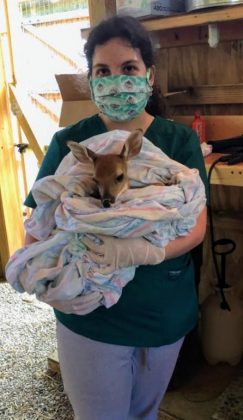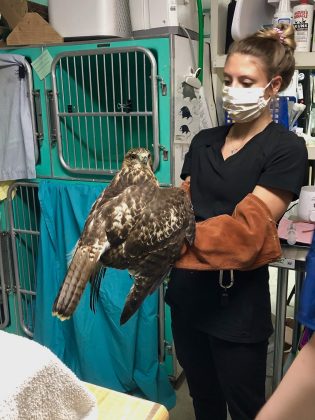A wildlife refuge nestled in Medford Township has given college students a “leg up” in their careers with a hands-on internship.
Medford Township and Medford Lakes students Carly Bowen and Grace Stern, respectively, are spending their summer at Woodford Cedar Run Wildlife Refuge caring and treating patients and residents.
“They’re doing cleaning, feeding, medication, vaccinations and all of that type of thing every single day,” said Lori Swanson, director of wildlife rehabilitation.
“They’re working with a wide spectrum of animals that come in for us, and that’s everything from a tiny little songbird to a fox, a raptor and things like that.”
Interns at the refuge typically dedicate 40 hours a week for 12 weeks to the on-site hospital. Interns usually work during the center’s busy season, May through the end of the summer.
Students are accepted from schools across the country, and Swanson put out calls for new interns to the National Wildlife Rehabilitators Association and area universities and colleges.
Bowen, a senior biology major at Drexel University, learned about the various species native to New Jersey during her internship, helping her find a calling to work with wildlife or exotic animals after veterinary school.
Stern, an environmental science senior at Fairleigh Dickinson, said the examination process upon receipt of an animal was what amazed her most about the internship.
“You’d see a bird with some missing feathers and know how it was, how it got into that shape, what animal attacked it and you can adjust its treatment plan,” she explained. “If a possum has scraggly fur, you look for bone issues.
“I didn’t think wild animals would be able to tell us so much.”
For Bowen, working with a variety of species at Cedar Run has equipped her with an experience and lesson she will cherish for a long time. She cared for baby raccoons and other small animals.
Some days were harder than others as Stern noticed not all the efforts she and other wildlife staff made to return an animal to stable health were successful. Despite that, her best times at the refuge involved releasing healthy animals back into the wild.
Staff at Cedar Run released a red-tail hawk on Aug. 11 at Kirby’s Mill, after it was brought to the refuge by a Stratford bystander. The hawk, Stern explained, was a hatchling at the time of its arrival and hospital staff raised it until it was able to live on its own in the wild. Hearing of its release touched Stern, who realized there “was a good chance I helped that hawk.”
Both students agreed working with wildlife has taught them more beyond the classroom and textbooks. Stern’s closest chance to work with wild animals was at a shelter caring for feral cats one summer.
Students seeking jobs in the veterinary field or at their state’s Division of Fish and Wildlife need a thorough, hands-on experience with animals, Swanson noted. So, 480 hours at Cedar Run can give students “an edge” when they apply for positions in the field.
“This gives them a little bit more experience in those species than a parrot or something like that,” she continued. “It gives them a bit of an expanded knowledge. Some will come back during vet school in the summer to continue on, and I think some of them hope to collaborate with the wildlife rehab.”
This year’s round of interns was tougher to acquire, Swanson shared, as some institutions barred students from taking non-virtual internships due to the pandemic. Cedar Run typically has 12 full-time interns, but accepted eight this year.
Bowen admitted she was nervous about taking the internship in the midst of COVID-19, given she would be among people she didn’t know. But those worried ebbed after some shifts with refuge staff.
A more humorous perspective on the pandemic colored Stern’s experience.
“It was weird at first, because there are a lot of people whose faces I haven’t seen and whose names I couldn’t place because I couldn’t see half of their faces. I still don’t know what they look like,” she said with a laugh.
“The mask was helpful in blocking out some of the stronger smells.”
Experience at Cedar Run helped Stern cement her future plans to study wildlife biology and attend veterinary school in the near future.
“If anyone is interested in wildlife, reach out to Cedar Run, because it’s an experience you will not get anywhere else,” Bowen said.




